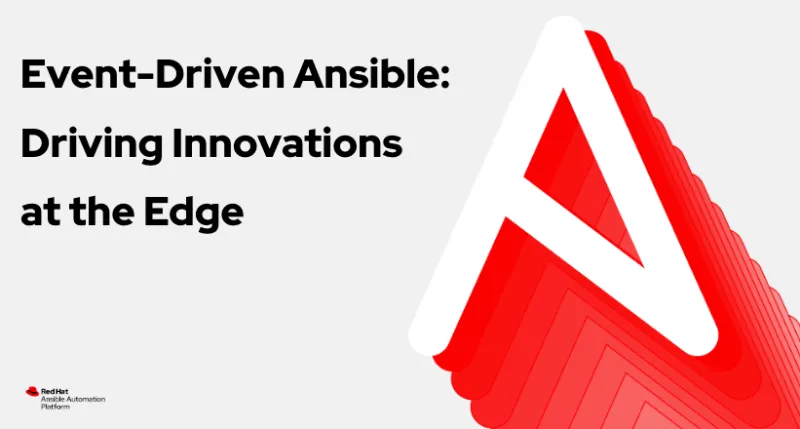
Across every industry, automation at the edge is enabling emerging use cases, helping organizations drive the next wave of innovation as they explore and execute digital transformation initiatives. The introduction of Event-Driven Ansible is especially exciting when considering the impacts to edge environments.
Event-Driven Ansible at the edge
The edge can bring new challenges of limited or no IT staffing in remote locations such as branches, stores, warehouses, or plant floors. These remote edge facilities are often more focused on Operational Technology (OT), or small form factor IT devices.
Having a single platform to enable manually and automatically initiated actions across an entire technology landscape – from data center to cloud to edge – is critical to facilitating IT/OT convergence, a necessity in order to maintain competitiveness.
Ansible Automation Platform does not require an agent to be present on a target system receiving an automated action, which is convenient and ideal for technologies that cannot host an agent, such as an edge device or network router. This feature makes Event-Driven Ansible a simpler solution to deploy and more capable of handling automation at the edge.
Where do you start? Think big, start small: from RCA (root-cause analysis) to auto remediation at the edge
A common scenario in IT management is that by the time a technician gets to look at a ticket, it is too late, production services are impacted, and downtime keeps adding up. Frequently, opened tickets do not provide enough information to provide effective root cause analysis. With the addition of Event-Driven Ansible to Ansible Automation Platform, you can now execute automation to perform the same actions that a level one support person would, providing all of the information that is needed so that corresponding tickets can be updated with great detail. The result? Better visibility and improved time to resolution.
Consider an example in retail stores. The help desk receives a ticket that POS (point of sale) systems are no longer working in several store locations. They manually run five steps to troubleshoot issues, potentially on multiple devices, and then update one or more tickets. Eventually the team realizes that the same ordered actions will fix this issue every time. Once they are comfortable that the same “fix” was successful in a substantial majority of instances, a decision can be made to create a playbook that can be leveraged to fix the issue automatically, instead of having to execute the same steps manually every time.

Once an organization is comfortable with this approach and realizes the benefits, the next phase is advancing to automated remediation. Event-Driven Ansible can be leveraged to trigger an automation rulebook with pre-built desired responses when certain conditions occur. This allows incident resolution to occur very rapidly and can help to deliver system-centric responses to changing conditions across the environment. By writing an Ansible Rulebook (similar to Ansible Playbooks, but more oriented to “if-then” scenarios) and allowing Event-Driven Ansible to subscribe to an event listening source, teams can more quickly and easily automate a variety of tasks across the organization. Event-Driven Ansible allows you all the power and flexibility you are accustomed to with Ansible: Rulebooks can do as much as you want or need them to; you remain in complete control of what they remediate.

Building on the retail example, consider a source message that indicates an intrusion on the network. The Ansible Rulebook can trigger a specific Ansible Playbook which will order ports to be shut down, to isolate the attacker. This can both alert incident response teams to an issue and deny an attacker time and opportunity to explore or exploit the network.

Call to Action
- Visit the Edge automation web page
- Check out the Edge Automation playlist on YouTube
- Watch Video: Creating Ansible Rulebooks
- Read IDC paper: Edge growth drives need for automating the last mile
- Experience self-paced interactive hands-on labs with Ansible Automation Platform
- Try Ansible Automation Platform free for 60 days
Sull'autore
Michele is an evangelist for automation, edge computing, artificial intelligence, and open hybrid cloud. She works closely with customers and partners to understand market requirements and then works with product management and engineering to ensure technology and solutions meet key market needs and will help move business value. She collaborates with partners to support strategic joint go-to-market initiatives in target verticals. Michele enjoys being an active member of global IoT consortiums, including the IoT Community, serving on the Board of Directors and also as the Co-Chair of the Women in IoT Center of Excellence since 2019. Prior to joining Red Hat in 2021, Michele spent seven years at SAS in various roles involving IoT and AI go-to-market strategy. She became one of the initial team members of the IoT Division, which she helped charter and in which she led product and partner marketing. Michele also held various roles during her 10-year tenure at IBM, including product management, product marketing, and program management.
Altri risultati simili a questo
Deterministic performance with Red Hat Enterprise Linux for industrial edge
Red Hat Enterprise Linux delivers deterministic performance for industrial TSN
Edge IT: A space odyssey | Technically Speaking
A vested interest in 5G | Technically Speaking
Ricerca per canale
Automazione
Novità sull'automazione IT di tecnologie, team e ambienti
Intelligenza artificiale
Aggiornamenti sulle piattaforme che consentono alle aziende di eseguire carichi di lavoro IA ovunque
Hybrid cloud open source
Scopri come affrontare il futuro in modo più agile grazie al cloud ibrido
Sicurezza
Le ultime novità sulle nostre soluzioni per ridurre i rischi nelle tecnologie e negli ambienti
Edge computing
Aggiornamenti sulle piattaforme che semplificano l'operatività edge
Infrastruttura
Le ultime novità sulla piattaforma Linux aziendale leader a livello mondiale
Applicazioni
Approfondimenti sulle nostre soluzioni alle sfide applicative più difficili
Virtualizzazione
Il futuro della virtualizzazione negli ambienti aziendali per i carichi di lavoro on premise o nel cloud
